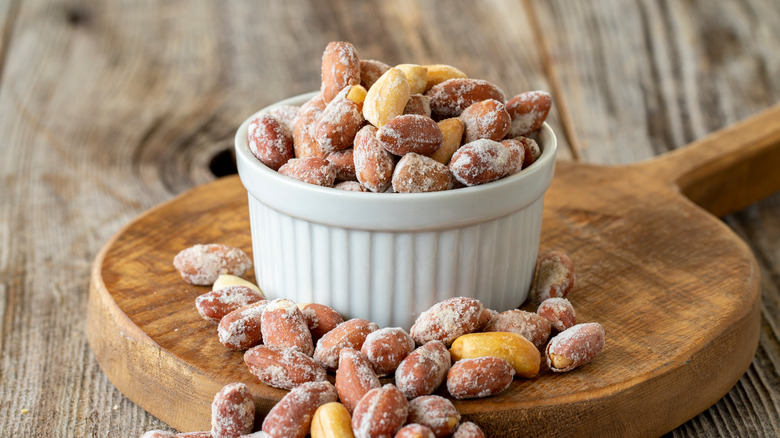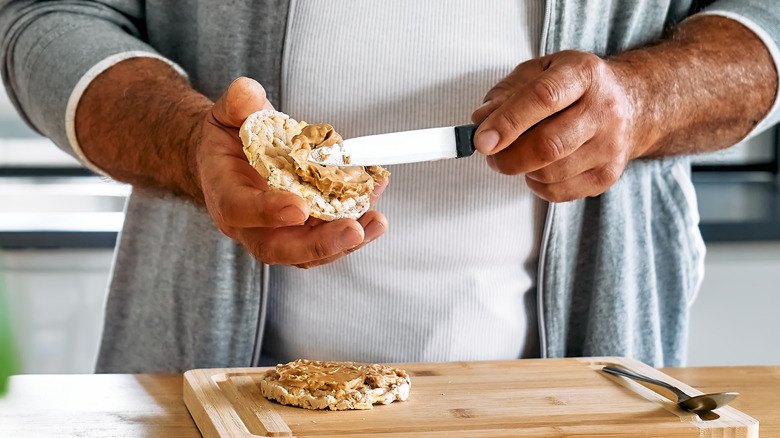The Popular Sandwich Spread That Helps Prevent The Risk Of Stroke
Someone in the United States suffers from a stroke every 40 seconds, according to the Centers for Disease Control and Prevention. While factors such as high blood pressure, smoking, high cholesterol, and obesity can cause a stroke, your diet can also play a role in your risk for stroke and other conditions such as heart disease and diabetes. A 2017 study in JAMA found that diets high in sodium, processed meats, and sugar-sweetened drinks can increase your risk for these cardiometabolic conditions. If your diet is low in nuts, seeds, omega-3 fatty acids from seafood, fruits, and vegetables, you could also put your body at risk for these diseases.
Mass General Brigham says you can lower your risk for stroke in just three months by making changes to your diet. Specifically, the Mediterranean diet can cut your risk of stroke with its emphasis on fruits, vegetables, whole grains, and beans. The Mediterranean diet also stresses the importance of healthy unsaturated fats through nuts and olive oil to reduce inflammation and improve your cardiovascular health. Yet your favorite sandwich spread as a kid might also help reduce your risk of stroke — peanut butter.
Peanuts can reduce the risk of stroke and other diseases
A 2021 study in Stroke followed more than 70,000 people in Japan for more than 13 years, looking at their diet and incidence of stroke, ischemic heart disease, and cardiovascular disease. The people who incorporated more peanuts in their diet had a lower risk for stroke, ischemic stroke, and cardiovascular disease. Ischemic strokes occur when blood is blocked from flowing into the brain and are the most common type of stroke.
Eating peanuts can also improve other aspects of your health. A 2022 study and meta-analysis in Frontiers in Nutrition found that regular consumption of roasted peanuts can reduce triglycerides and improve cholesterol ratios among healthy people. According to a 2019 article in Antioxidants, a diet including peanuts and other tree nuts can reduce your risk of some cancers of the lung, stomach, throat, colon, and pancreas. Consuming more peanuts is also associated with improved cognitive health and a lower incidence of depression in older adults.
What makes peanut butter healthy
Although much of the research has been on peanuts, peanut butter can be healthy if you choose natural peanut butter that contains only peanuts and just a bit of salt. Some brands of peanut butter will have added sugar and artificial ingredients, so be sure to look at the list of ingredients. These days, some grocery stores will allow you to grind enough peanuts to make fresh peanut butter. Two tablespoons of peanut butter have 188 calories, 8 grams of protein, and 16 grams of fat. Peanut butter also has about 2 grams of saturated fat, but it has 7 grams of healthy monounsaturated fat and 4 grams of polyunsaturated fat.
Peanut butter has specific nutrients that can improve your health, according to WebMD. Even though it's high in fat, the omega-6 fatty acids and oleic acid in peanut butter can help reduce your cholesterol. Peanut butter also has arginine to improve your blood vessels and antioxidants coumaric acid and resveratrol to protect your cells from free radicals. Remember that peanut butter is also high in calories, so enjoy the health benefits of peanut butter in moderation.



